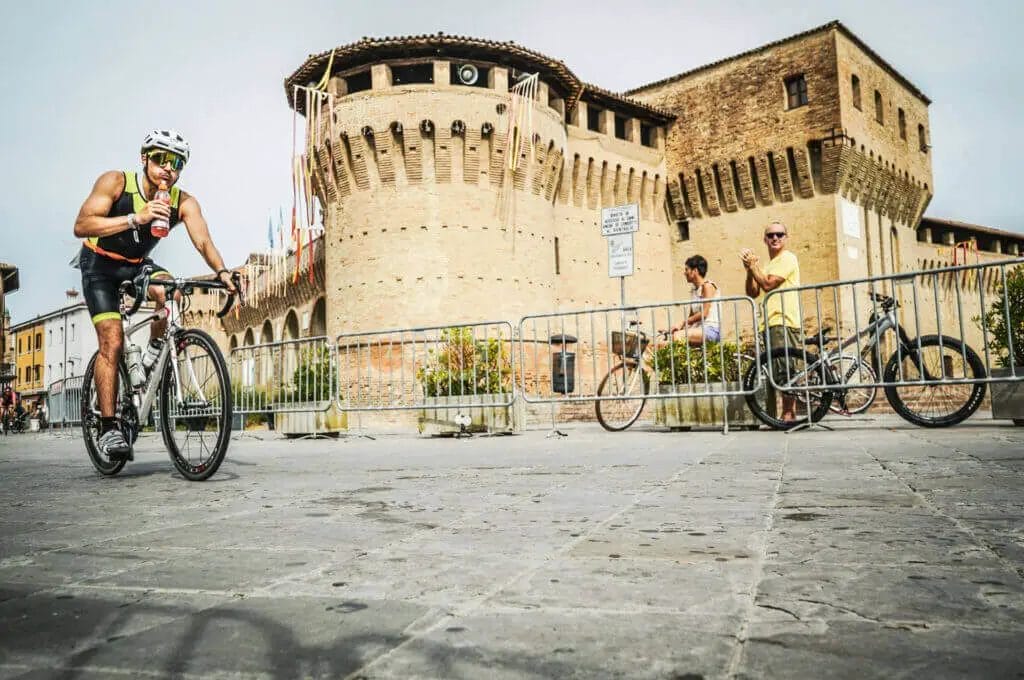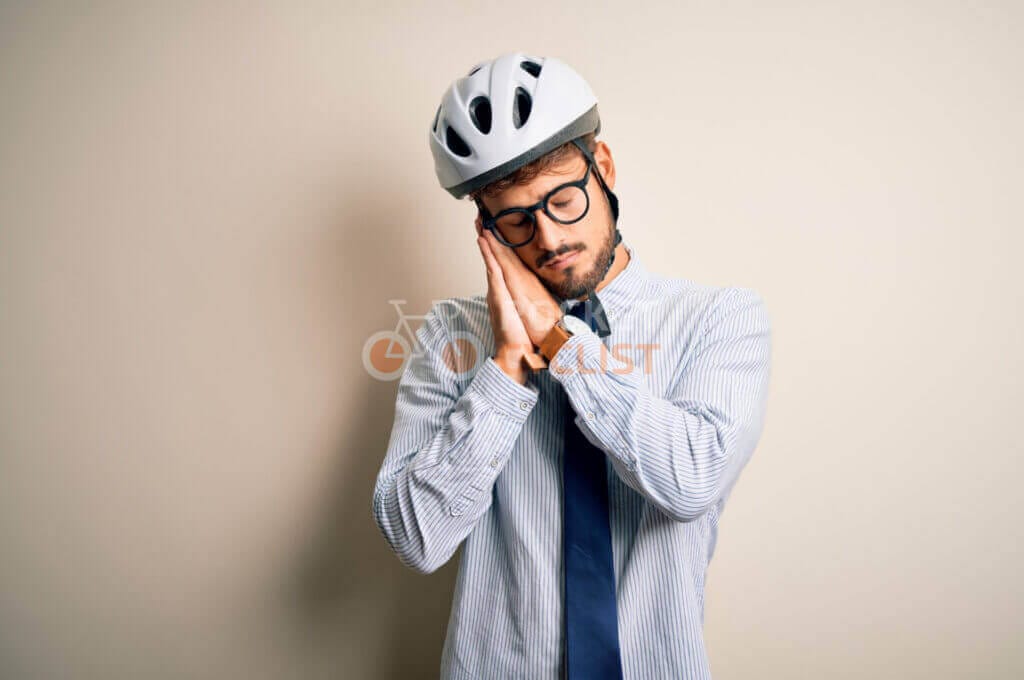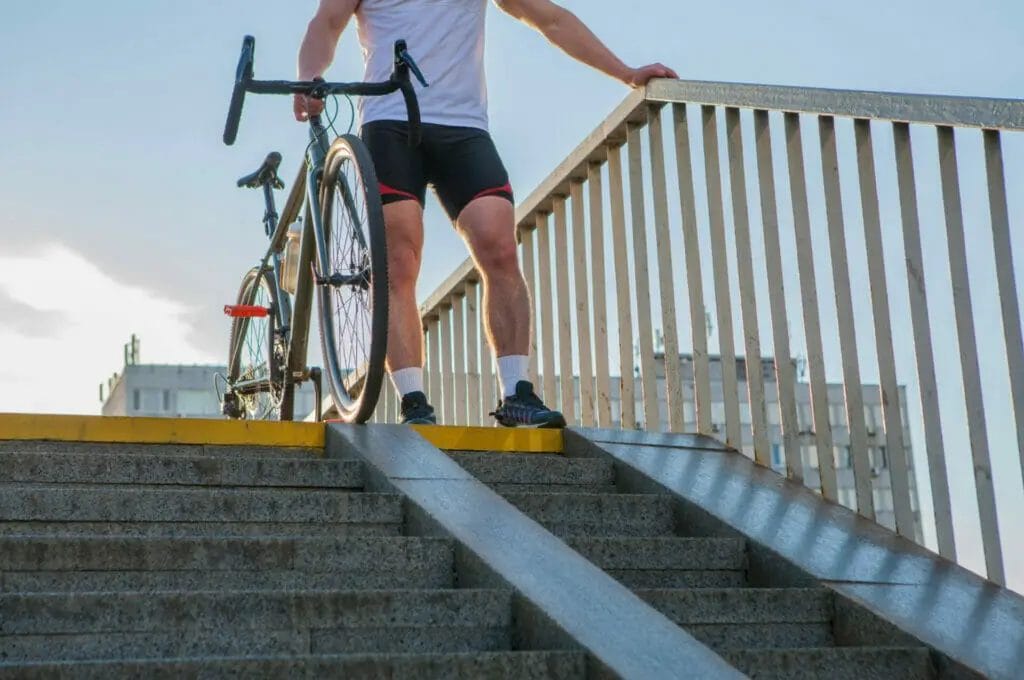Last Updated on April 7, 2024 by Vinson Lozano

Potential risks of biking without sleep
You might wonder if it’s alright to hop onto your bike after a sleepless night. To put it simply, it’s not. Sleep is crucially important for physical activities like biking.
Understanding the Importance of Sleep for Physical Activity
Lack of sleep can slow down your reaction times, make it harder for you to concentrate, and negatively affect your motor skills – all of which are vital for safe biking. Imagine being on a challenging biking trail, and due to inadequate sleep, your brain is not able to assess the circumstances accurately. Scary, right?
Potential Risks of Biking Without Sleep

Biking requires your full attention, coordination, and split-second decision-making abilities. A sleepless night can dull all these faculties, increasing the risk of accidents. Drowsiness can build up over prolonged periods of activity, leading to ‘micro-sleeps’, where you may experience short periods of sleep involuntarily. This is, obviously, not something you want when you’re in control of a bike. Your cognitive and physical performance can diminish sharply, making it dangerous to be on the road or trails. Also, continuous sleep deprivation can lead to severe health issues in the long term.
So next time you struggle to catch those recommended seven to nine hours of sleep, think twice before going for a bike ride. Prioritize rest to ensure not just a safer biking experience but a healthier life overall.
Negative impact on coordination and reaction time
Consider yourself in the driver’s seat; you are on your bike, ready for a long ride. But if you had a sleepless night before, your biking skills might not be up to par. Sleep deprivation can seriously hamper your coordination and reaction time. Navigating traffic, negotiating a sharp turn, or even balancing yourself would require extra effort because your brain isn’t functioning optimally. A laggy response time means you could be a split second late in reacting to a sudden obstacle, and this can increase the chance of mishaps on the road. Remember, even a slight delay in reaction can lead to dire consequences.
Decreased Endurance and Muscle Recovery
Endurance is critical when it comes to biking; it’s not just about speed but your ability to sustain the ride. Sleep deprivation can decrease endurance levels, making every mile feel like a giant leap. Additionally, it’s important to understand the role of sleep in muscle recovery. When you sleep, your body goes into repair mode, mending those muscles you strained during the day. Neglecting sleep can interrupt this recovery process, leading to muscle fatigue and a subsequent drop in biking performance.
Sleep also balances your energy levels. A restless night can lead to a bike ride that feels more draining, both mentally and physically. Furthermore, your body may not respond as expected to exercise without enough sleep, hindering exercise efficiency and making the biking experience more challenging.
In conclusion, biking without sufficient sleep isn’t a game you’d want to play. It’s not just about an energy crash or feeling tired; it’s about slower reaction times, decreased co-ordination, diminished endurance, and compromised muscle recovery, which together spell danger, especially when you are on the road. So, it’s always a wise decision to ensure optimal sleep before you embark on your next biking adventure. After all, safety should be your top priority, and well-being is an essential part of the ride as well.
Risks and Dangers of Biking with No Sleep

While you may be tempted to take your bike out for a spin after a sleep-deprived night, trusting your reflexes to keep you safe may not be the best idea. The drawbacks of biking on little to no sleep can lead to detrimental consequences. Beyond diminished endurance and slower muscle recovery, the risks and dangers expand to increased likelihood of accidents and skewed decision-making.
Increased Likelihood of Accidents and Injuries
The most significant risk of biking when sleep-deprived is the enhanced possibility of accidents. Even the slightest impairment in your motor skills from sleep deprivation can turn a regular biking route into a danger zone. Whether it’s swerving unexpectedly, losing control of your balance, or slowing down your reaction times, each of these can potentially lead to a serious collision or fall.
Sharp turns or sudden brakes can introduce an element of risk not normally present, especially when you’re operating at less than full capacity. A fraction of a second can make the difference between a close call and an injury. And with sleep deprivation marring your physical coordination, you’re more prone to misjudging those crucial seconds.
Impaired Decision-Making and Judgement
Beyond physical coordination, biking requires a certain level of cognitive ability—especially in decision-making and judgement. Biking isn’t just about pedalling; it’s about making split-second decisions that can directly impact your safety. When should you overtake? Can you squeeze through that closing gap in traffic? Is there enough time to make that light before it turns red?
In a state of sleep deprivation, your ability to make these decisions might be compromised. Lack of sleep can cloud your judgement, slowing your decision-making process and potentially putting you in danger.
In conclusion, biking on little to no sleep comes with significant risks, from accidents and injuries to impaired judgement. Therefore, if you’re in a sleep-depleted state, biking should be avoided. Like any physical activity, it requires acute awareness—both of your body and your surroundings. That can be tough to do when fighting off the effects of sleep deprivation. So, before you jump onto your bike after a sleepless night, remember these risks. Opt for safety, rest, and recovery before hitting the road. After all, your well-being is as vital as the ride itself.
Strategies for a Safe and Optimal Bike Ride
Prioritizing Adequate Sleep before Biking

It is important to recognize the risks and dangers of biking with no sleep. While you may be tempted to take your bike out for a spin after a sleepless night, it is crucial to prioritize your well-being and the safety of others on the road. Lack of sleep can lead to diminished endurance, slower muscle recovery, impaired decision-making, and increased likelihood of accidents.
To ensure a safe and optimal bike ride, it is recommended to prioritize adequate sleep before hitting the road. Aim for at least seven to eight hours of uninterrupted sleep to ensure that you are well-rested and mentally alert. This will help improve your focus, reaction time, and overall cognitive ability while biking. Remember, your safety and the safety of others should always come first.
Tips for Managing Fatigue during Long Rides

If you find yourself on a long bike ride and fatigue starts to set in, there are a few strategies you can follow to manage your energy levels and minimize the risks:
- Take Breaks: Plan regular breaks during your ride to rest and recharge. Find a suitable spot to stop, stretch your muscles, hydrate, and have a snack. This will help prevent fatigue and keep you alert throughout your ride.
- Stay Hydrated: Dehydration can amplify feelings of fatigue. Make sure to drink water and electrolyte-rich beverages throughout your ride to stay properly hydrated. This will help maintain your energy levels and ward off fatigue.
- Pace Yourself: Avoid pushing yourself too hard and find a comfortable pace that allows you to maintain your energy for the duration of your ride. Pushing through extreme fatigue can impair your judgement and increase the likelihood of accidents.
- Listen to Your Body: Pay attention to any signs of excessive fatigue, such as increased muscle weakness or mental fogginess. If you feel fatigued to the point where it is affecting your ability to bike safely, it is wise to stop and rest. Your body knows its limits, so listen to it and take the necessary breaks.
Remember, biking requires acute awareness of your body, surroundings, and safety. Riding while sleep-deprived adds unnecessary risks and compromises your ability to make split-second decisions. Prioritize adequate sleep before biking and implement strategies to manage fatigue during long rides. By doing so, you can ensure a safe and enjoyable biking experience while minimizing the risks associated with biking with no sleep.
Conclusion
While it may be tempting to hop on your bike and go for a ride, it is crucial to prioritize your well-being and the safety of others on the road. Biking with no sleep can lead to diminished endurance, impaired decision-making, and an increased likelihood of accidents. To ensure a safe and optimal bike ride, it is important to prioritize adequate sleep before hitting the road and to manage fatigue during long rides. Taking regular breaks, staying hydrated, pacing yourself, and listening to your body are all strategies that can help minimize the risks associated with biking without proper rest.
Balancing the Love for Biking with the Need for Proper Rest
Biking is undoubtedly a passion for many enthusiasts, but it is essential to strike a balance between that love and the need for proper rest. It may be tempting to push through fatigue and go for a ride, but this can have serious consequences. Diminished endurance and impaired decision-making can put you and others at risk on the road. So, before you go biking, make sure to prioritize adequate sleep. Aim for at least seven to eight hours of uninterrupted sleep to ensure that you are well-rested and mentally alert.
During long rides, it is natural for fatigue to set in. However, there are strategies you can implement to manage your energy levels and minimize the risks. Taking regular breaks to rest and recharge is essential to avoid excessive fatigue. Find a suitable spot to stretch your muscles, hydrate, and have a snack. This will prevent fatigue and keep you alert throughout your ride.
Staying properly hydrated is also crucial for maintaining your energy levels. Dehydration can amplify feelings of fatigue, so make sure to drink enough water and electrolyte-rich beverages during your ride. This will help to ward off fatigue and keep you energized.
While it is important to challenge yourself, it is equally important to pace yourself. Find a comfortable pace that allows you to maintain your energy for the duration of your ride. Pushing through extreme fatigue can impair your judgment and increase the likelihood of accidents. It is important to know your limits and listen to your body.
At the end of the day, biking requires acute awareness of your body, surroundings, and safety. Riding while sleep-deprived adds unnecessary risks and compromises your ability to make split-second decisions. So, prioritize adequate sleep before going for a ride, and implement strategies to manage fatigue during long rides.
By taking these precautions, you can ensure a safe and enjoyable biking experience while minimizing the risks associated with biking with no sleep. Remember, your safety and the safety of others on the road should always come first. So, enjoy your ride, but make sure to get the proper rest you need.


